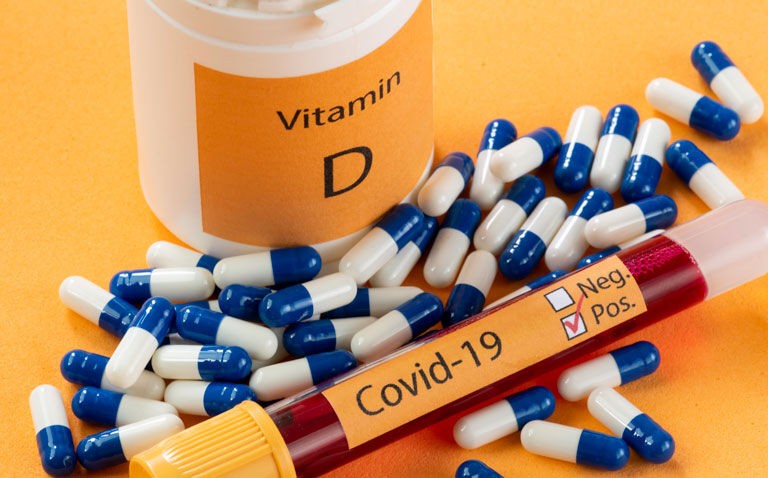Vitamin D supplementation given to those with a suboptimal status for 6 months had no impact on acute respiratory infections or COVID-19
Vitamin D supplementation (VDS) given to patients identified having suboptimal levels of the vitamin for a period of six months had no effect on the development of all cause acute respiratory infections or COVID-19 according to the findings of a randomised, placebo-controlled trial by a team of UK researchers.
Much has been written on the potential role of vitamin D or VDS as a means of preventing or reducing the adverse sequelae associated with a COVID-19 infection. In fact, regulation of immune function continues to be one of the most well-recognised extra-skeletal actions of vitamin D and there is data indicating that vitamin D up-regulates LL-37, a well-known antimicrobial peptide with antiviral effects and a which provides mechanism through which the vitamin could protect against COVID-19.
During the course of the COVID-19 pandemic, a meta-analysis of observational studies involving nearly 2 million adults, suggested vitamin D deficiency/insufficiency increased susceptibility to COVID-19 and severe COVID-19, although there was a high risk of bias and heterogeneity in studies.
However, there is a lack of randomised, controlled trials of VDS in COVID-19 apart from one small, double-blind, placebo-controlled trial of vitamin D supplementation in healthcare workers which found a 77% lower risk of becoming infected among those who received the supplement.
For the present study, researchers used a test and treat approach to correct suboptimal vitamin D levels and to then determine the effect on the risk of all cause acute respiratory tract infections and COVID-19. Individuals were recruited from the COVIDENCE UK research study and offered a finger prick test to determine vitamin D status.
Participants were then randomised into two groups if their blood 25-hydroxyvitamin D levels were < 75 nmol/L; a low group (800 IU/day) or a high group (3200 IU/day), for 6 month course of vitamin D supplementation. A third group, designated ‘no offer’ served as the placebo arm, i.e. those from the COVIDENCE trial who did not get supplementation and individuals were then randomised 2:1:1 (no offer, low dose, high dose).
During the 6-month follow-up, participants were emailed every month with questionnaires to capture incident swab test positive or doctor diagnosed acute respiratory tract infections (including COVID-19) and details of any hospital admission, ventilatory support within hospital and prescriptions for antibiotics.
The primary outcome was the proportion of participants who had at least one swab test confirmed or doctor confirmed acute respiratory tract infection. The secondary outcome was the proportion developing a PCR confirmed COVID-19 infection although subgroup analysis was performed examining the impact on hospitalisation and mortality.
Vitamin D supplementation and COVID-19 infection
A total of 6,200 participants with a median age of 60.2 years (67% female) were included and randomised to ‘no offer’ (3,100) or 800 IU/day (1550) with the remainder receiving the higher dose. By the end of the trial (June 2021), 89.1% of participants had one or more doses of a COVID-19 vaccine although at the start, only 0.4% of participants were fully vaccinated.
Overall, 299 participants experienced the primary end point, i.e., at least one test swab confirmed or doctor confirmed acute respiratory tract infection. Compared to the ‘no offer’ group, there was no statistically significant difference for the low dose group (Odds ratio, OR = 1.26, 95% CI 0.96 – 1.66 , p = 0.10) or for the higher dose group (OR = 1.09, 95% CI 0.82 – 1.46, p = 0.55).
For the secondary outcome of COVID-19 infection, there were also no significant differences for a swab confirmed test between the ‘no offer’ and low dose group (OR = 1.39, 95% CI 0.98 – 1.97, p = 0.07) or for the higher dose group (OR = 1.13, 95% CI 0.78 – 1.63, p = 0.53). Similarly, there were no significant differences for admission to hospital, in-hospital use of ventilatory support or death.
The authors concluded that while vitamin D supplementation led to increases in serum 25-hydroxyvitamin D levels, this was not associated with protection against all cause acute respiratory tract infections or COVID-19.
Citation
Jollife DA et al. Effect of a test-and-treat approach to vitamin D supplementation on risk of all cause acute respiratory tract infection and covid-19: phase 3 randomised controlled trial (CORONAVIT) BMJ 2022










